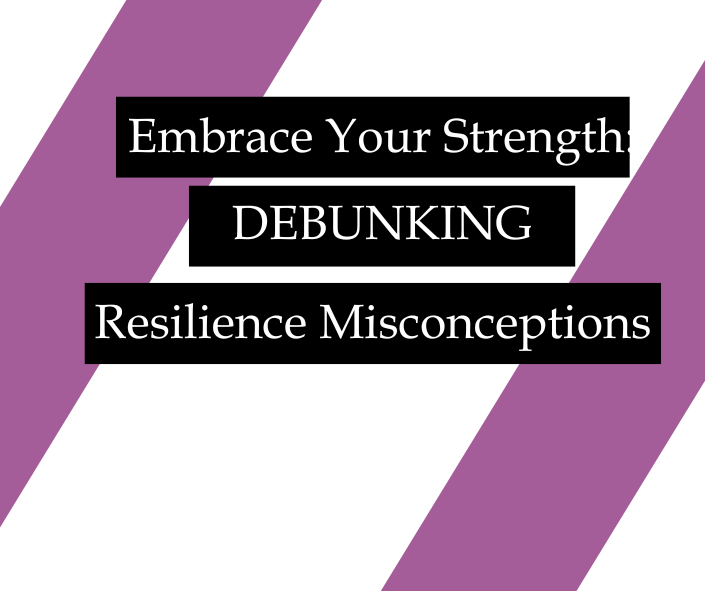August 9, 2023

Embrace Your Strength: Debunking Resilience Misconception
Which resilience misconception have you heard? As high-achieving Black female executives, we know that we face unique challenges in both our personal and professional lives. As we strive to excel in our careers, maintain work-life balance, and achieve personal fulfillment, resilience is a vital component of our journey. However, here are several common misconceptions surrounding resilience that can hinder our progress if left unaddressed.
Resilience Misconception #1: Resilience is solely about toughing it out.
While enduring difficult situations is certainly part of resilience, it is not the whole story. Rather than solely relying on our own strength and fortitude, resilience requires a combination of coping strategies, seeking help when needed, and utilizing resources to navigate challenges. Developing these skills can empower us to overcome obstacles and emerge stronger and dispel resilience misconceptions. Allowing us to be more resilient than before.
When you think about resilience: Resilience is not only about enduring tough situations, but also about recognizing when we need external resources to help us develop the resilience we need. Seeking support is a sign of strength, not weakness. It reflects an understanding that we cannot navigate every challenge on our own and acknowledging that it can take courage to ask for help.
Resilience Misconception #2: Resilience means never experiencing stress or setbacks.
It is easy to believe that resilience means we should never feel stressed or encounter setbacks. However, this belief can actually hinder our ability to be resilient. Resilience is not about avoiding stress but instead developing the skills necessary to adapt and thrive even during difficult times.
Better way to look at resilience: Resilience is the ability to adapt and recover in the face of adversity. Instead of avoiding challenges, we can embrace them as opportunities for growth and development. Further, we should develop the skill of viewing obstacles as opportunities to learn new skills or to gain insights that can strengthen us in the face of future challenges.
Resilience Misconception #3: Resilience is an innate trait.
Often, people assume that resilience is an innate trait that some possess while others lack. However, this belief is not accurate. Resilience can be developed through a variety of strategies and techniques to help us thrive, no matter the adversity we face.
Remember when building resilience: It is possible to develop resilience, regardless of the genetic or personality traits we possess. Developing resilience is a journey of growth and self-care that involves taking intentional actions to build skills and practices that support resilience. With time and commitment, anyone can develop the resilience to navigate life’s challenges.
Resilience Misconception #4: Resilience is a solitary endeavor.
Individualism often promotes the idea that resilience is only an individual pursuit. However, resilience thrives within the context of community and support networks. Building and maintaining supportive relationships provide us with the support, guidance, and encouragement we need to overcome challenges successfully.
Here’s a better way to look at resilience: Resilience benefits from a robust support network. Surrounding ourselves with people who uplift and encourage us is an essential element of resilience that supports us through thick and thin. Building supportive relationships creates both a strong foundation on which to build resilience as well as a network of sources to turn to for support during challenging times. Successful Black women know that having a career coach in your support network is invaluable.
Resilience Misconception #5: Resilience eliminates the need for self-care.
There is a temptation to believe that resilience means neglecting self-care to always be at peak performance. This belief, however, is misguided and is actually counterproductive to building and maintaining resilience. Instead, self-care is an integral component of developing resilience and finding success and meaning in our lives.
Better way to look at resilience and self-care: Self-care is a necessary ingredient in building a strong foundation for resilience. Prioritizing self-care isn’t just a means to an end, but a practice that allows us to prioritize our well-being, manage stress, and sustain our energy and endurance for the long haul. We should never overlook the importance of self-care when building resilience and navigating our journeys towards success and fulfillment.
As high-achieving Black female executives, we face unique challenges that are nuanced and multifaceted. By dispelling these resilience misconceptions and embracing a new perspective on strength, we can cultivate the skills necessary to navigate the obstacles we face. By prioritizing self-care, embracing challenges, and growing supportive relationships, we can become stronger, more resilient versions of ourselves.
🌟 Do You Know Your Resilience Level? 🌟
In a world that’s always changing, resilience is the strength we all need. It’s not just about how we face challenges, but also how we bounce back from them. But the question is, do you truly know how resilient you are?
🔍 Want to understand your level of resilience?
Here’s your chance! In just 3 minutes, I can show you a way to identify your resilience levels. Uncover your hidden strengths and potential areas of growth.
📩 Email me NOW at twanna@twannacarter.com and embark on a journey of self-awareness and empowerment. Find out if you’re ready to face life’s challenges head-on or if there’s room to grow even stronger.
💪🏾 Discover the power within you. Because resilience isn’t just a trait—it’s a mindset. Let’s unlock yours together! 💌
xoxox Dr. Twanna Carter
+ show Comments
- Hide Comments
add a comment